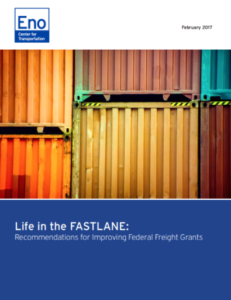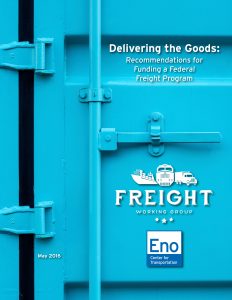Purpose
Eno’s Freight Working Group is a standing advisory group on all matters relating to freight policy. The group, made up of diverse stakeholders, provides Eno staff with insights, knowledge, feedback, and guidance on how to approach some of the most challenging freight transportation problems of today. Members of the group have the following responsibilities and roles:
- Serve as a resource for Eno and the industry on challenging freight issues
- Suggest topics of focus for future work and provide feedback on Eno work products
- Meet 2-4 times annually in Washington, DC to discuss work progress
Working Group members are sometimes asked to sign on to work products, particularly if there are consensus based policy recommendations found within the report. But being part of the Working Group does not mean an endorsement of all products, and working group members are not required to sign on to any potential policy recommendations. Regardless, Eno makes every attempt to incorporate the feedback from all working group members when developing reports and recommendations.
The working group focuses on four broad topic areas that have constantly changing policy issues:
- Federal funding. The first report released out of the Freight Working Group was Delivering the Goods: Recommendation for Funding a Federal Freight Program. The consensus-based recommendation included specific general fund and user fee components, subject to several caveats. Eno staff continues to develop specifics around how general fund transfers and a Cost of Freight Shipment fee (COFS) could work in an administratively reasonable manner. The Working Group is developing research on how the specifics of these recommendations will develop.
- Federal freight programs and regulations. Federal transportation laws MAP-21 (2012) and FAST (2015), among other laws, included significant investment programs and regulatory measures for freight. Working Group members have targeted several of these policy components for analysis, and Eno is developing short reports and recommendations. The next expected report is going to provide recommendations to the next administration on improvements to the FASTLANE discretionary grants.
- Local, state, and regional freight policy. There are a myriad of issues affecting freight at the local, state, and regional levels. For example, ports and intermodal facilities, in particular, have supply chain congestion problems that must be addressed as globalization increases. Working Group members are guiding Eno as to which of these issues are the most important for further policy analysis. The next project is planning to examine policies that shape local access to and from major port facilities.
- Private sector innovation. New innovations, ranging from self-driving technologies and delivery drones to advanced logistics systems, could transform many traditional freight markets. In concert with Eno’s Digital Cities program, the Working Group is providing guidance on how best shape future policies. Eno is examining how driverless trucks, trains, and ships could affect supply chains, and how public policies should respond.
Deliverables

Authors: Paul Lewis, Jeff Davis
Published: February 14, 2017

Lead Author: Paul Lewis, Vice President of Policy and Finance
Contributors: Elizabeth Bastian, Robert Puentes, Joshua Schank
Published: May 2016
Interested in becoming a member? Contact Eno’s Vice President of Policy and Finance, Paul Lewis, at plewis@enotrans.org.



